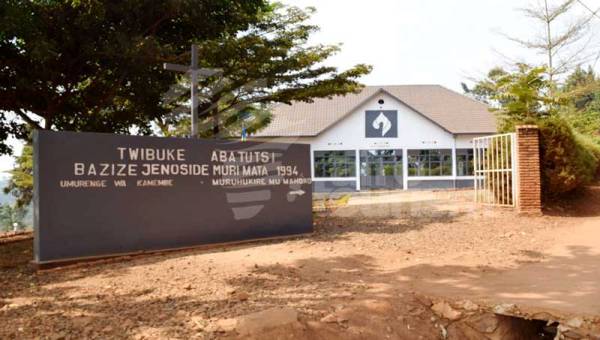
A recent study conducted by the National Commission for the Fight against Genocide (CNLG) on the history of the Genocide against the Tutsi in former Cyangugu Prefecture shows that from November 1, 1959 until July 1, 1962, Rwanda was on turmoil in what was called “social revolution” of 1959.
The turbulence led to the killings of thousands of tutsi across the country, others exorcized from their properties and forced to flee to neighboring countries including Uganda, Burundi, Tanzania and Democratic Republic of the Congo (DRC).
In cyangugu prefecture, the killings begun in the end of November 1959. In this moths, Tutsi were killed, especially in Mururu where vice-chief Senuma administered. Since then, Tutsi administrators mainly chiefs, vice-chiefs and their stewards started immediately to flee to Bukavu in DRC.
In 1960, acts of violence and killings continued. In May 1960,the Tutsi of Cyangugu were killed, especially in Nyamasheke where vice-chief Nyirinkindi administered. Apart from the killings, many homes of Tutsi households were blazed. In October 1960, many houses of Tutsi households were burnt in the Impala chiefdom especially in Biguzi, Shangi and Shagasha. The burning of houses of Tutsi households was accompanied by acts of different acts of violence including expelling them from their properties and forcing them to flee to Burundi and Democratic Republic of Congo.
In the end of 1960, things became worse in the whole Cyangugu Prefecture. During this year, politicians, especially partisans of the PARMEHUTU, heightened hatred between Hutu and Tutsi, which culminated into the storm movement to blasé the houses of Tutsi households and expel them from November 1960.
When fleeing, the Tutsi were transported by buses from the Democratic Republic of the Congo. At this time, there was a campaign to burn out the houses of those who were fleeing immediately after they had left.
The acts of expelling the Tutsi and putting on fire their homes spread across the whole Cyangugu prefecture. In the commune of Kamembe, these abhorring acts of burning the houses of Tutsi and expel them started with chief Rwanyabugigiri who dwelt at Nkanka in Gitwa. After expelling him, they burnt his house and looted his livestock. Upon realizing that he could even be killed, Rwanyabugigiri immediately fled. Since then, the houses of Tutsi across Kamembe were put on fire. A few identified victims of these acts of burning houses of Tutsi include Bihutu, Misago Laurent and Bandora Vénant both from Gihundwe, Ruboneka, Ngarukiye and Nkangara both from Nkombo among others.
In Cyimbogo commune, identified victims include chief Rusasura’s mother, Innocent who dwelt in Winteko; i Nyamagana they burned the house of Baritazari who used to work to chief Biniga’s home, the house of Euphrasie; and those Ambroise, Anselme, Bihugu, Martin Bihuku, Rusuku Mathieu in Gitovu among others. After they houses were blazed, they all fled to Democratic Republic of the Congo.
In the commune of Nyakabuye, they put on fire the houses of Segisoromo Pascal, Rwandekwe Léodomir, Maro, Paul, Rwatambuga Pangarasi, Mahenehene Célestin who dwelt in Nyabitimbo. They also blazed the houses of Bushikoko Célestin and Kamananga both from Mashesha, Nkuta Athanase and others. After their houses were put on fire, their families fled to Burundi and Democratic Republic of the Congo.
In the Bugarama commune, houses put on fire belonged to Bizimana Fabien, Rukwavu who dwelt in Nyampanga and Shyirambere Aloys among others. Many Tutsi were also forced to leave their properties including Bayito, Nyampeta and his son in law, Sebitama, Gatarayiha, the sons of Musuhuke, Muhobera, Piyo, Nyamutezi, Murinda André, Bipfuko, Mukankusi, and Rukoro who was son to chief Gisazi, Saidi Sefu, Saidi Hamisi, Ibrahim Birara and others. They fled to Burundi. Immediately after they had left, their houses were destroyed.
In the commune of Karengera they blazed the houses of Munyangeyo Martin, the family of Nzarubara, the family of Muhinda Theobald and his three sisters, together with many others were forced to leave their properties and fled.
In the Gisuma commune, blazed houses belonged to Nsengimana Callixte, Karekezi Zacharie, Renzaho Ildephonse, Sembasha, Bidindira and others. After their houses were put on fire, they fled to Democratic Republic of the Congo.
In the commune of Gafunzo, they burned the houses belonging to Nyiramugufi Véronique who dwelt in Mugera and destroyed the house belonging to Antoine. There were many propagandists of PARMEHUTU in the communes of Gafunzo and Gisuma who played pivotal role in heightening hate between Hutu and Tutsi since 1959.
Among them, we may indicate Sarukundo who was the first burgomaster of the commune of Nyabitekeri , Karima who was from Mwito, Rukeratabaro from Bushenge who once served as the burgomaster of the Bushenge commune, Kanyabacuzi from Shagasha who served as the burgomaster of the Shagasha commune and others.
Expelling the Tutsi and burning of their houses spread in all parts of Cyangugu Prefecture. In the commune of Gatare, many houses belonging to Tutsi were put on fire especially in Rudaga, an area that was normally inhabited by many Tutsi families.
The disharmony was also manifested in ordinary life. Since 1961, young partisans of PARMEHUTU, notorious as “abajenesi” used to sing in daytime singing publicly that “Abatutsi bose bazajya i Nyamata, akazasigara kose tuzagapfakaza, iyumvire LUNARI icyo washakaga!”, loosely translated as “All Tutsi will go to Nyamata, whoever will remain, we will make him/her a widow/widower, listen LUNARI what you sought.” In that time there was the evil campaign to expel the Tutsi to Nyamata in Bugesera.
In general, since the so called social revolution in 1959, acts of violence and expelling the Tutsi were instated. As the Tutsi had no other choices, with neither support nor protection, they fled to Burundi and democratic Republic of Congo. Their properties were either destroyed or taken by the Hutu who forced them in exile. (End)
